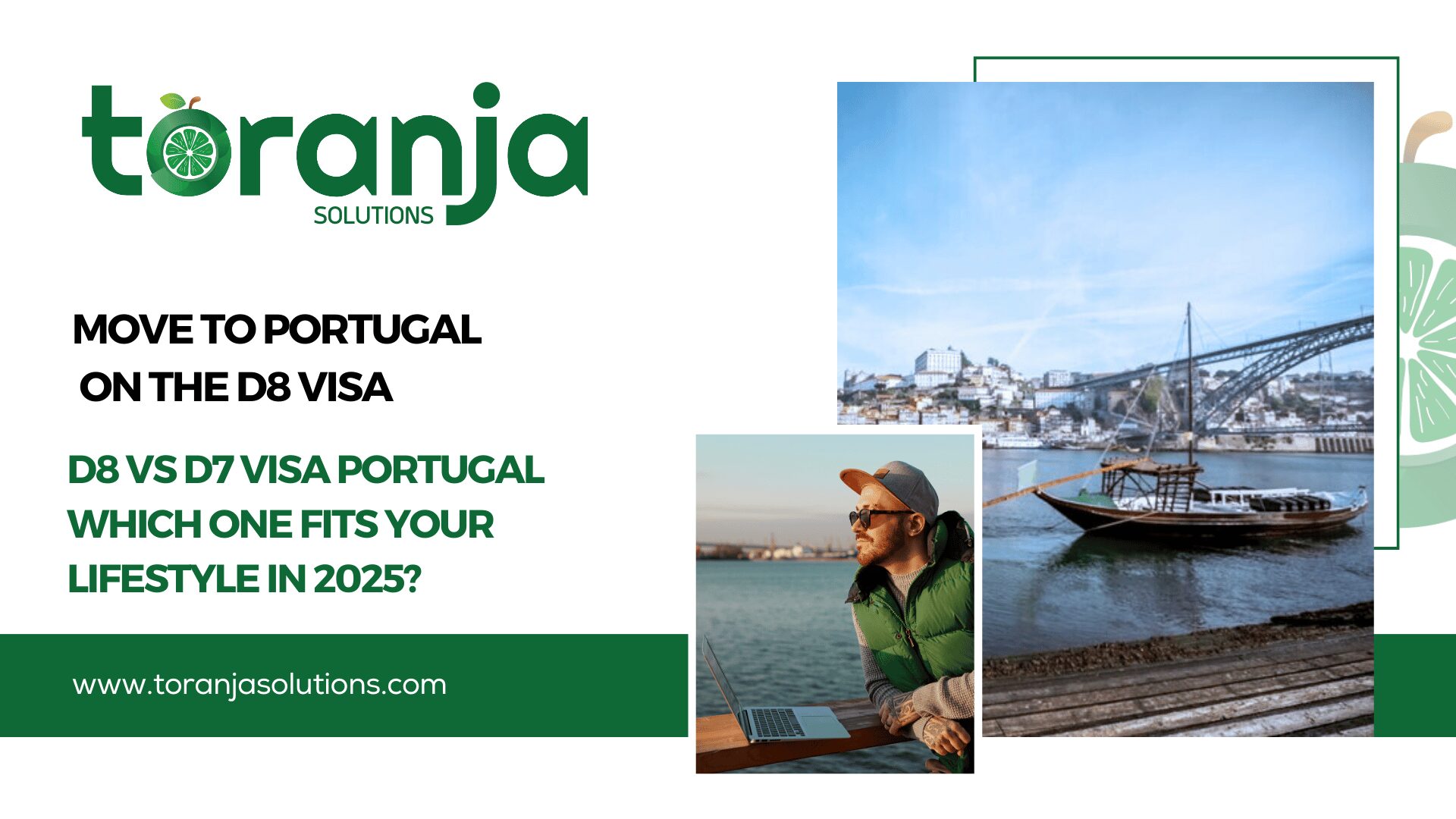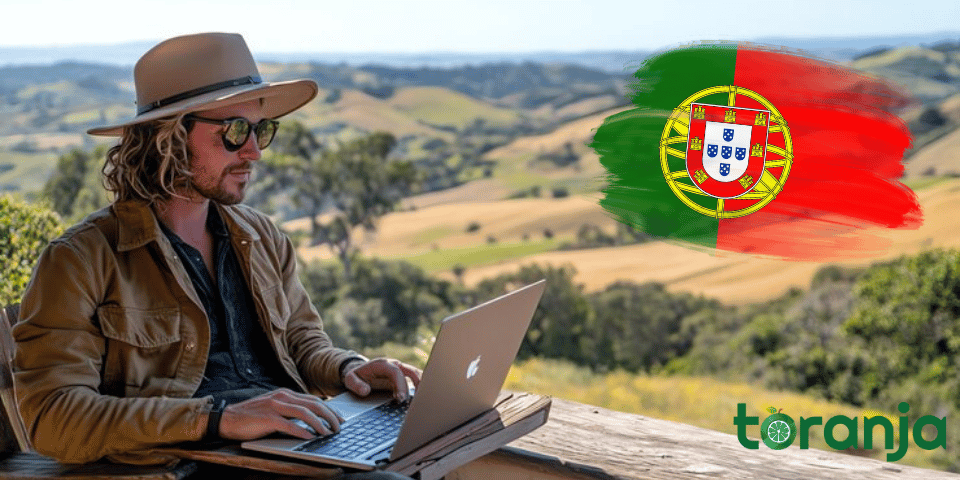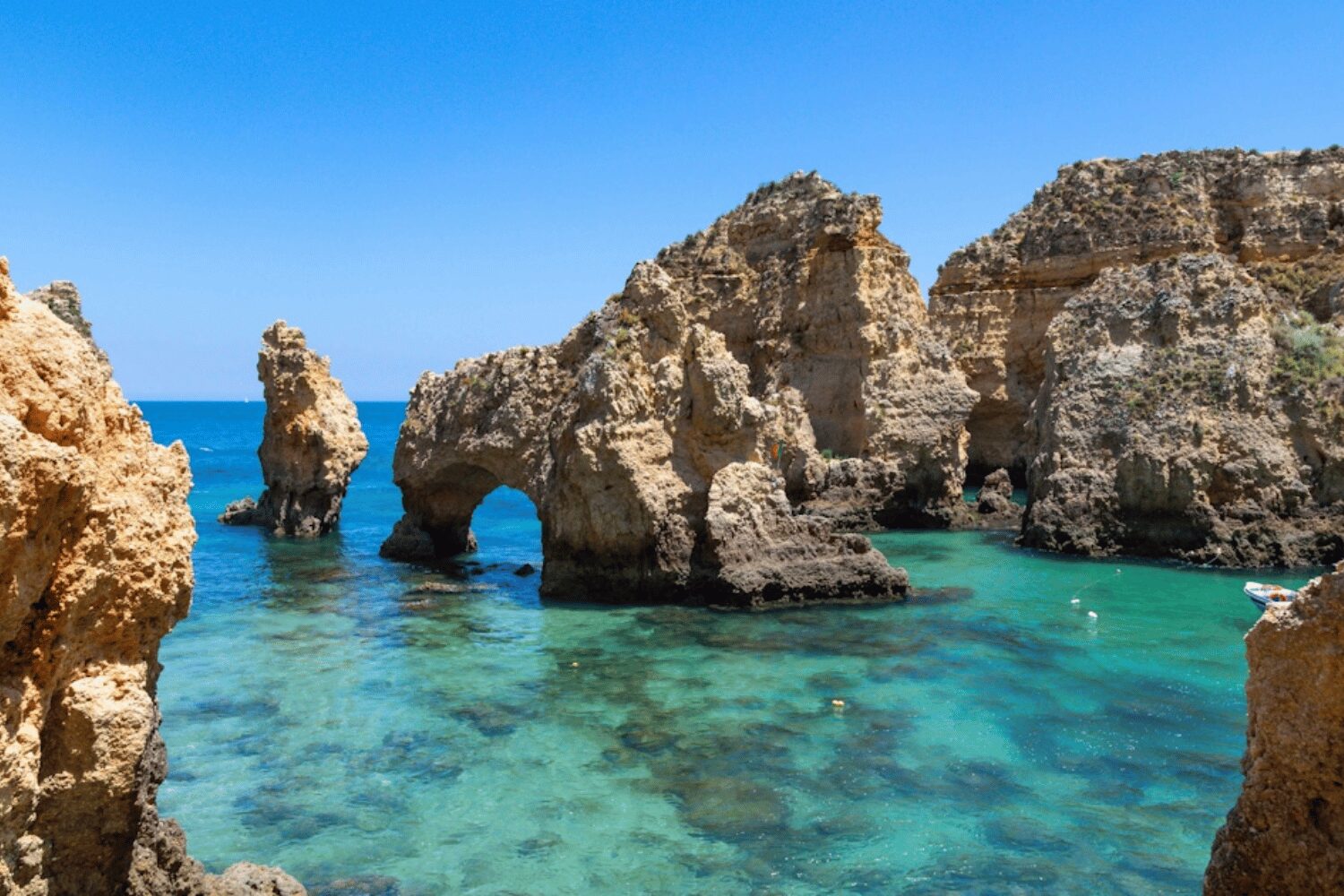
Portugal Digital Nomad Visa (D8) 2025: Your Complete How-To Guide
In a world where remote work has become the norm, Portugal stands out as a premier destination for digital nomads. As of 2025, the Portugal Digital Nomad Visa (D8) continues to attract professionals from the United States and United Kingdom seeking sun, affordability, and a thriving tech ecosystem. This guide provides everything you need to know to apply successfully.
Learn more at Toranja Solution.
What is the Portugal D8 Visa (Digital Nomad Visa)?
The Portugal D8 Visa, formally known as the Residence Visa for Remote Workers, was launched in October 2022. It is tailored for non-EU citizens who work remotely for companies or clients located outside of Portugal. Unlike traditional visas, the D8 caters specifically to the modern reality of digital careers. Applicants are not required to invest significant capital or establish a local business, making it more accessible to a wide range of professionals.
The visa grants an initial two-year residency, renewable for an additional three years. After five years, holders may apply for permanent residency or Portuguese citizenship, offering a potential pathway to EU citizenship.
Requirements for the D8 Visa in 2025
1. Income Requirements
Applicants must demonstrate a minimum monthly income of €3,040 (approximately £2,580 or $3,300), sourced from remote work arrangements outside Portugal. This ensures self-sufficiency without burdening the Portuguese economy.
Income sources can include:
-
Employment with companies abroad
-
Freelance contracts with international clients
-
Earnings from a business registered outside Portugal
Proof is required through employment contracts, client agreements, recent bank statements, and tax returns.
2. Remote Work Verification
For a successful application, it is crucial to verify your remote work status. Employees should present a letter from their employer confirming the ability to work remotely from Portugal. Freelancers must show client contracts and a portfolio of recent work, while entrepreneurs should provide business registration documents and evidence of ongoing operations.
3. Documentation Requirements
Essential documents include:
-
A valid passport
-
Completed visa application form
-
Two recent passport-sized photographs
-
Proof of accommodation
-
Comprehensive private health insurance covering a minimum of €30,000
-
Criminal record certificate (issued within 90 days)
-
Proof of remote work income
-
Personal statement explaining the remote work situation and reasons for moving to Portugal
-
Portuguese NIF (tax number)
Non-Portuguese documents often need to be officially translated and apostilled.
4. Accommodation Requirements
Applicants must demonstrate an accommodation plan through a property deed, rental contract, or hotel/Airbnb booking for the initial stay.
5. Health Insurance Requirements
Private health insurance must cover medical emergencies, hospitalization, and repatriation, with a minimum coverage of €30,000.

Step-by-Step Application Process
Step 1: Gather Required Documentation
Start early. Collecting necessary documents, including criminal records and translations, typically takes 1-2 months.
Step 2: Obtain a Portuguese Tax Number (NIF)
A NIF is essential for most bureaucratic processes in Portugal. It can be obtained at a Finanças office, Portuguese consulate, or through authorized service providers.
Step 3: Secure Initial Accommodation
Initial accommodation evidence can be a property purchase, a rental contract, or hotel/Airbnb bookings for your first weeks.
Step 4: Submit Your Application
Schedule an appointment at your nearest Portuguese consulate. Be prepared to submit documents, provide biometric data, and pay an application fee of about €90.
Step 5: Await Visa Approval
Processing times vary but generally range from 30 to 90 days, depending on consulate workload.
Step 6: Enter Portugal and Register with SEF
Upon visa approval, you will receive a temporary visa valid for 120 days. Once in Portugal, schedule an appointment with SEF (Immigration and Borders Service) to complete the residency permit process.
Comparison: D8 vs. D7 Visa
| Feature | D8 Visa | D7 Visa |
|---|---|---|
| Income Source Requirements | Active income from remote work | Passive income from pensions or investments |
| Minimum Income Thresholds | €3,040 monthly | €870 monthly |
| Application Complexity | Proof of employment and remote work required | Emphasis on financial self-sufficiency |
| Ideal Applicant Profiles | Remote workers, freelancers, and entrepreneurs | Retirees and passive income earners |
Best Cities in Portugal for Digital Nomads

Lisbon: The Vibrant Capital
Lisbon offers a dynamic tech ecosystem, countless coworking spaces, excellent international connectivity, and a vibrant cultural scene. Neighborhoods like Cais do Sodré and Príncipe Real are particularly attractive to digital nomads.

Porto: Cultural Haven with Lower Costs
Porto offers a compelling mix of lower living costs (10-15% cheaper than Lisbon), a thriving creative community, and a rich cultural heritage, making it an increasingly popular alternative to Lisbon.

Madeira: Digital Nomad Village
Madeira’s Digital Nomad Village in Ponta do Sol provides a supportive community, free coworking spaces, and a mild year-round climate. It is ideal for remote workers seeking stunning landscapes and a slower pace of life.

Algarve: Sun, Sea, and Connectivity
With over 300 days of sunshine annually, beautiful beaches, and emerging coworking spaces, the Algarve region is perfect for nomads prioritizing work-life balance.
Digital Infrastructure and Coworking in Portugal
Internet Connectivity
Portugal boasts impressive internet speeds averaging 180 Mbps, with some urban centers offering even faster connections. Fiber-optic internet is widely available in most cities and towns, and efforts are ongoing to expand coverage to rural regions. The country’s investment in digital infrastructure is evident through:
-
Extensive 5G rollout across major cities
-
Free Wi-Fi access in many cafés, libraries, and public spaces
-
Reliable connectivity ranking above the European average
Remote workers in Portugal benefit from minimal downtime and the flexibility to work from a variety of environments beyond traditional office setups.
Coworking Spaces
The coworking ecosystem in Portugal is flourishing, catering to diverse professional needs. Options range from boutique spaces to larger hubs, equipped with modern amenities to boost productivity. Notable coworking spaces include:
-
Lisbon:
-
LACS
-
Second Home
-
Heden
-
-
Porto:
-
Porto i/o
-
Typographia Cowork
-
-
Algarve and Madeira:
-
Faro Avenida Business Center
-
The Cowork Lab
-
Centro Cowork Portimão
-
Coworking spaces frequently host:
-
Workshops
-
Networking events
-
Social gatherings
These activities enrich both professional development and social integration for digital nomads.
Digital Nomad Communities
Portugal’s digital nomad communities are vibrant and welcoming, with a strong online and offline presence. Activities include:
-
Meetup groups in Lisbon, Porto, and Madeira organizing regular social and networking events
-
Active Facebook groups like “Digital Nomads Portugal” and specialized Slack communities
-
Major tech events like the Web Summit in Lisbon, drawing thousands of participants globally
Dedicated initiatives such as the Digital Nomad Village in Madeira further support newcomers by offering structured programs and community-building activities, solidifying Portugal’s reputation as a global remote work hub.
Tax and Financial Benefits
Potential Tax Benefits
Portugal remains highly attractive for digital nomads due to its favorable tax conditions. Although some benefits have evolved in recent years, freelancers and independent workers still enjoy a simplified tax regime that allows for automatic deduction of a portion of their income as expenses. Additionally, Portugal maintains double taxation treaties with both the United Kingdom and the United States, providing mechanisms to avoid being taxed twice on the same income.
Cost of Living Comparison
Compared to cities like London and New York, Portugal offers substantial savings in everyday living expenses. It is estimated that digital nomads can expect a reduction of approximately 30% to 50% in their overall living costs. Housing, transportation, dining, and entertainment are all notably more affordable, making Portugal an attractive base for maintaining a high quality of life while spending less.
Banking and Financial Considerations
Setting up banking in Portugal is relatively straightforward. To open a Portuguese bank account, applicants need to present their NIF (Portuguese tax number), a valid passport, and proof of address. Traditional banks such as Millennium BCP, Novo Banco, and Caixa Geral de Depósitos are widely accessible, while digital-savvy nomads often opt for fintech solutions like Wise and Revolut.
Conclusion
The Portugal D8 Visa is a modern and adaptable immigration solution that reflects the shift toward remote and location-independent work. For freelancers, digital entrepreneurs, and remote professionals from the UK and USA, it opens the door to enjoying life in Europe while continuing their global careers.
With its affordable cost of living, fast and reliable internet, supportive communities, and excellent lifestyle, Portugal is quickly becoming a top choice for those looking to leave behind the financial and lifestyle pressures of cities like London or New York. The D8 Visa offers a clear and legal path to make that transition smooth and sustainable.
Although the process requires careful organization and the right documentation, partnering with experienced professionals like Toranja Solutions can make a significant difference. Their team offers step-by-step support for UK and US digital nomads — from gathering the right documents to helping you settle into life in Portugal.
Thinking about making the move? Get in touch with Toranja Solutions for personalized assistance on your D8 Visa journey. They’re experts at simplifying the Portuguese immigration process for remote workers just like you.
Frequently Asked Questions about the D8 Visa
The D8 Visa is intended for remote workers earning primarily from abroad. While it’s generally acceptable to have occasional Portuguese clients, your main income must come from outside Portugal. If your professional activity is mostly based in Portugal, other visa types like the D1 (employment) or D2 (entrepreneurship) may be more appropriate.
Portugal operates on Western European Time (WET), which is 5 hours ahead of U.S. Eastern Time and 8 hours ahead of Pacific Time. Many remote workers adjust their schedules to work later in the day, aligning with U.S. business hours—giving them free mornings and a better balance between work and lifestyle.
Portuguese is not mandatory to obtain the D8 Visa. In cities and expat-friendly areas, English is widely spoken, especially in tech and digital nomad circles. That said, learning basic Portuguese greatly enriches your daily life and integration. If you plan to apply for permanent residency or citizenship later, you’ll need to pass a simple language test (A2 level).
Yes, family reunification is allowed. You can apply together with your spouse or partner, children under 18, and parents over 65. However, each dependent increases the financial requirements—50% more for a spouse and 30% for each child. All family members must provide their own documentation but will have the same residency rights.
Losing your job doesn’t immediately put your residency at risk. You should try to secure new remote work quickly, and having savings helps prove financial stability. During your permit renewal (usually after two years), authorities will evaluate your overall financial situation—gaps in income are acceptable if they’re temporary and well justified.
While the D8 Visa is for entering Portugal, once your residence permit is approved, you can travel freely within the Schengen Zone. This allows stays of up to 90 days in any 180-day period in other Schengen countries—making Portugal a great base for exploring Europe.
If you stay in Portugal for more than 183 days in a year, you become a tax resident and are taxed on global income. Portugal has tax treaties with countries like the U.S. and U.K. to avoid double taxation. It’s essential to consult a tax advisor who understands both Portuguese tax law and your country of origin to stay compliant and make the most of your situation.
Other Relevant News
-
Digital Transformation in Portugal 2025: Best Opportunities for Small Business Growth
In recent years, Portugal has become a top destination for digital nomads seeAs Portugal accelerates its digital evolution, 2025 stands out as a pivotal year for small businesses aiming to harness the power of digital transformation. In a competitive global market where technology dictates the pace of innovation, Portuguese small enterprises face unique opportunities to enhance efficiency, expand their reach, and deliver superior customer experiences through digital adoption.king sun, surf, and a solid internet connection. But as more remote workers flock to Lisbon, Porto, and the Algarve, one important question arises: how does the Portuguese tax system treat digital nomads? Is it the fiscal paradise many claim it to be—or are there hidden obligations every nomad should know?
June 5, 2025Read More -
How to Start a Business in Portugal: A Step-by-Step Guide for Foreign Entrepreneurs
Starting a business in Portugal as a foreigner is easier than you think. This comprehensive guide walks you through every step — from getting your NIF and visa to choosing the right company structure and navigating local laws. Whether you’re an entrepreneur, freelancer, or investor, discover how to turn your business idea into reality in Portugal.
June 3, 2025Read More -
Portugal Digital Nomad Visa (D8) 2025: Your Complete How-To Guide
Discover the 2025 Portugal Golden Visa changes, new investment paths, and how UK and US citizens can gain residency with simplified application rules.
May 14, 2025Read More






